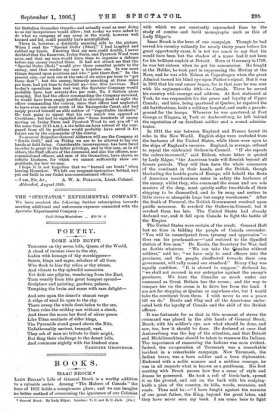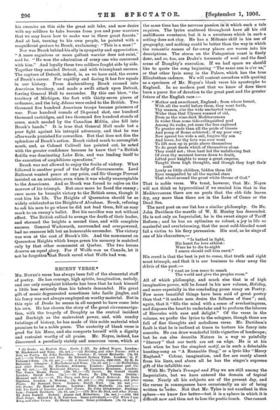BOOKS.
ISAAC BROCX.*
LADY EDGAR'S Life of General Brock is a worthy addition to a valuable series. Among "The Makers of Canada" the hero of 1812 holds a conspicuous place; and we can imagine no better method of overcoming the ignorance of our Colonies • General Brock, By Lady Edgar. London: T. C. and E. C. Jack. [21s.]
with which we are constantly reproached than by the study of concise and lucid monographs such as this of Lady Edgar's.
Isaac Brock is the hero of one campaign. Though he had served his country valiantly for nearly thirty years before his great opportunity came, it is not too much to say that his would have been but the shadow of a name had it not been for his brilliant exploit at Detroit. Born at Guernsey in 1769, he was but sixteen when he got his commission. He fought at the Helder, he took part in suppressing the Mutiny at the Nore, and he was with Nelson at Copenhagen when the great Admiral turned his blind eye. upon Parker's signal. But it was in 1802 that his real career began, for in that year he was sent with his regiment—the 49th—to Canada. There he served his country with courage and address. At first stationed at York, he was responsible for the peace and loyalty of Upper Canada; and later, being quartered at Quebec, he repaired the old fortifications, built a military hospital, and made a parade- ground for the troops. Wherever he was quartered, at Fort George or Niagara, at York or Amherstburg, he left behind the reputation of an excellent soldier and a sound adminis- trator.
In 1811 the war' between England and France found its echo in the New World. English ships were excluded from the harbours of the United States, while these were open to the ships of England's enemies. England, in revenge, refused to repeal the celebrated Orders-in-Council. "If she repeals the orders-in-council," said Ridout, whose letter is quoted by Lady Edgar, "the American trade will flourish beyond all former -periods. They will then have the whole commerce of the continent in their hands, and the British, though blockading the hostile ports of Europe, will behold the fleets of American merchantmen enter in safety the harbours of the enemy, whilst they, who command the ocean and are sole masters of the deep, must quietly suffer two-thirds of their shipping to be dismantled, and to lie snug and useless in little rivers or alongside huge but empty warehouses." After the death of Perceval, the British Government resolved upon pacific measures. It revoked the Orders-in-Council, but it revoked them too late. The United States had already declared war, and it fell upon Canada to fight the battle of the Empire.
The United States were certain of the result. General Hull lost no time in bidding the people of Canada surrender. "You will be emancipated from tyranny and oppression "- thus ran his proclamation—" and restored to the dignified station of free men." Dr. Eustis, the Secretary for War, had no doubts whatever. "We can take the ianadas without soldiers," said he ; "we have only to send officers into the provinces, and the people, disaffected towards their own government, will rally round our standard." Henry Clay was equally confident. "It is absurd to suppose," declared he, "we shall not succeed in our enterprise against the enemy's provinces. We have the Canadas as much under our command as Great Britain has the ocean; and the way to conquer her on the ocean is to drive her from the land. I am not for stopping at Quebec or anywhere else, but I would take the continent from them. I wish never to see a peace till we do." Eustis and Clay and all the Americans under- rated both the loyalty of Canada and the skill of the British officers.
It was fortunate for us that in this moment of stress the command was placed in the able hands of General Brock. Brock, with his soldier's eye, saw what should be done, and saw, too, bow it should be done. He declared at once that Amherstburg was the key of the situation, and that Detroit and Michilimackinac should be taken to reassure the Indians. The importance of reassuring the Indiana was soon evident. Indeed, the co-operation of Tecumseh was a remarkable ' incident in a remarkable campaign. Now Tecumseh, the Indian brave, was a born soldier and a born diplomatist. Endowed with a noble manner and a sublime courage, he was in all respects what is known as a gentleman. His first meeting with Brock proves how fine a sense of style and drama he possessed. He took a roll of birch-bark, spread it on the ground, and cut on the bark with his scalping- knife a plan of the country, its hills, woods, morasses, and roads. Then said he :—" I have fought against the enemies of our great father, the King, beyond the great lakes, and they have never seen my back. I am come here to fight
his enemies on this side the great salt lake, and now desire with my soldiers to take lessons from you and your warriors that we may learn how to make war in these great forests." And at last, turning to his own people, he pointed with a magnificent gesture to Brock, exclaiming: "This is a man !"
Nor was Brock behind his ally in sympathy and appreciation. "A more sagacious or more gallant warrior does not exist," said he. "He won the admiration of every one who conversed
with him." And loyally these two soldiers fought side by side. Together they assailed Detroit, and with triumphant success. The capture of Detroit, indeed, is, as we have said, the crown of Brock's career. For rapidity and daring it has few equals in our history. From Amberstburg Brock crossed into American territory, and made a swift attack upon Detroit, forcing General Hull to surrender. By this one blow, "the territory of Michigan, the fort with thirty-seven pieces of ordnance, and the brig Adams were ceded to the British. Two thousand five hundred American troops became prisoners of war. Four hundred rounds of 24-pound shot, one hundred thousand cartridges, and two thousand five hundred stands of arms, much needed by the Canadian Militia, also fell into Brock's hands." It is true that General Hull made but a poor fight against his intrepid adversary, and that he was afterwards punished for cowardice. But that does not dim the splendour of Brock's action. Brock risked much to accomplish much, and, as Colonel Callwell has pointed out, he acted with the greater confidence because he knew that "a British flotilla was dominating „Lake Erie, and was lending itself to the execution of amphibious operations."
Brock was not allowed to enjoy the fruits of victory. What followed is another proof of the folly of Governments. Lord Bathurst wanted peace at any price, and Sir George Prevost insisted on an armistice, even when it was wholly unacceptable to the Americans. And so Brock was forced to rdire on the morrow of his triumph. But once more be faced the enemy ; once more he brought victory to the British arms, though it cost him his life. The Heights of Queenston should be as widely celebrated as the Heights of Abraham. Brock, refusing to ask his men to go where he did not lead them, fell an easy mark to an enemy's bullet. But his sacrifice was not without effect. The British rallied to avenge the death of their leader, and stormed the heights a second time, and with complete success. General Wadsworth, surrounded and overpowered, had no resource left but an honourable surrender. The victory was won at the cost of Brock's life. And the monument on Queenston Heights which keeps green his memory is matched only by that other monument at Quebec. The two heroes deserve an equalylory. For if Wolfe won us Canada, let it not be forgotten‘hat Brock saved what Wolfe had won.



































 Previous page
Previous page